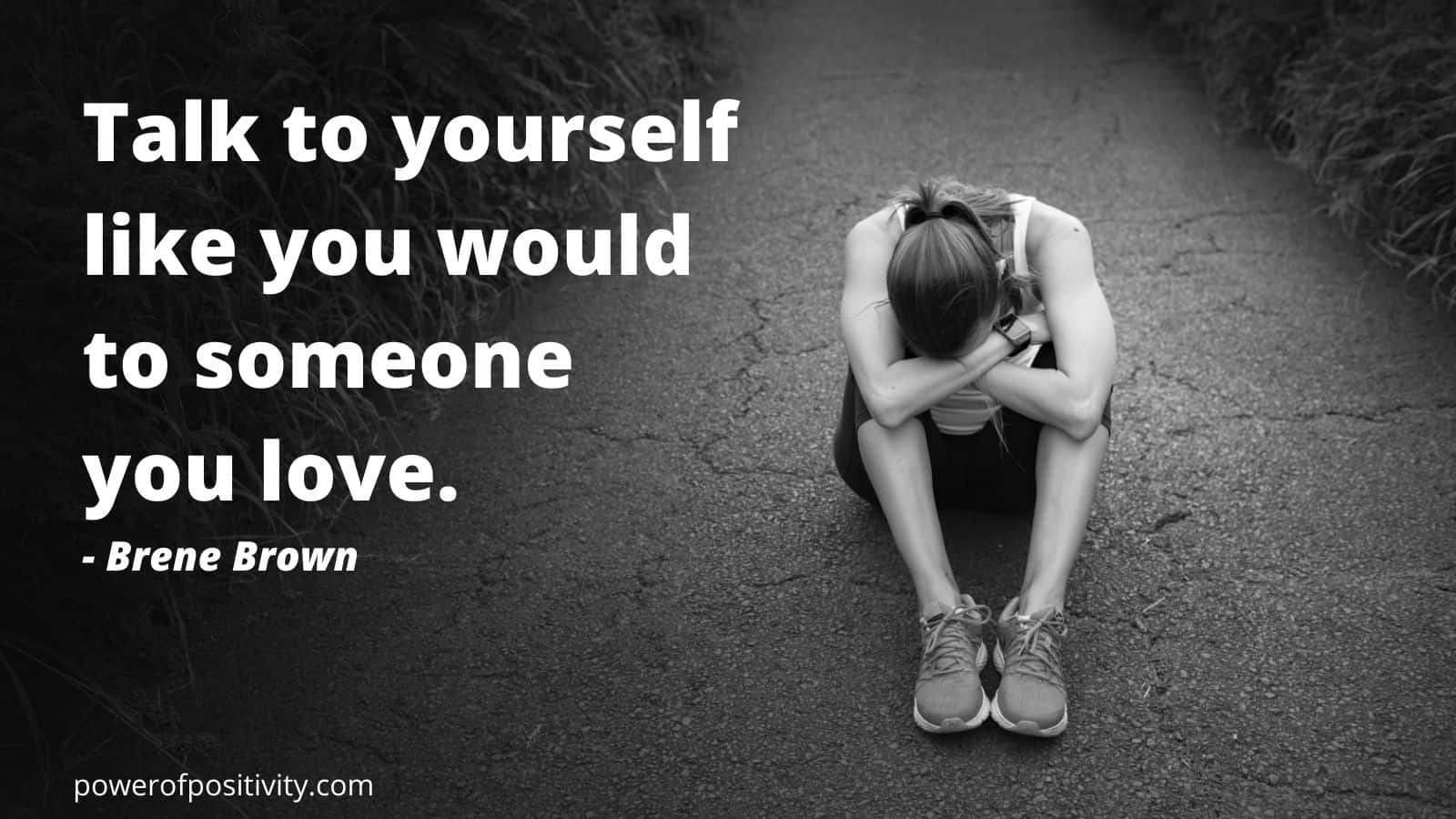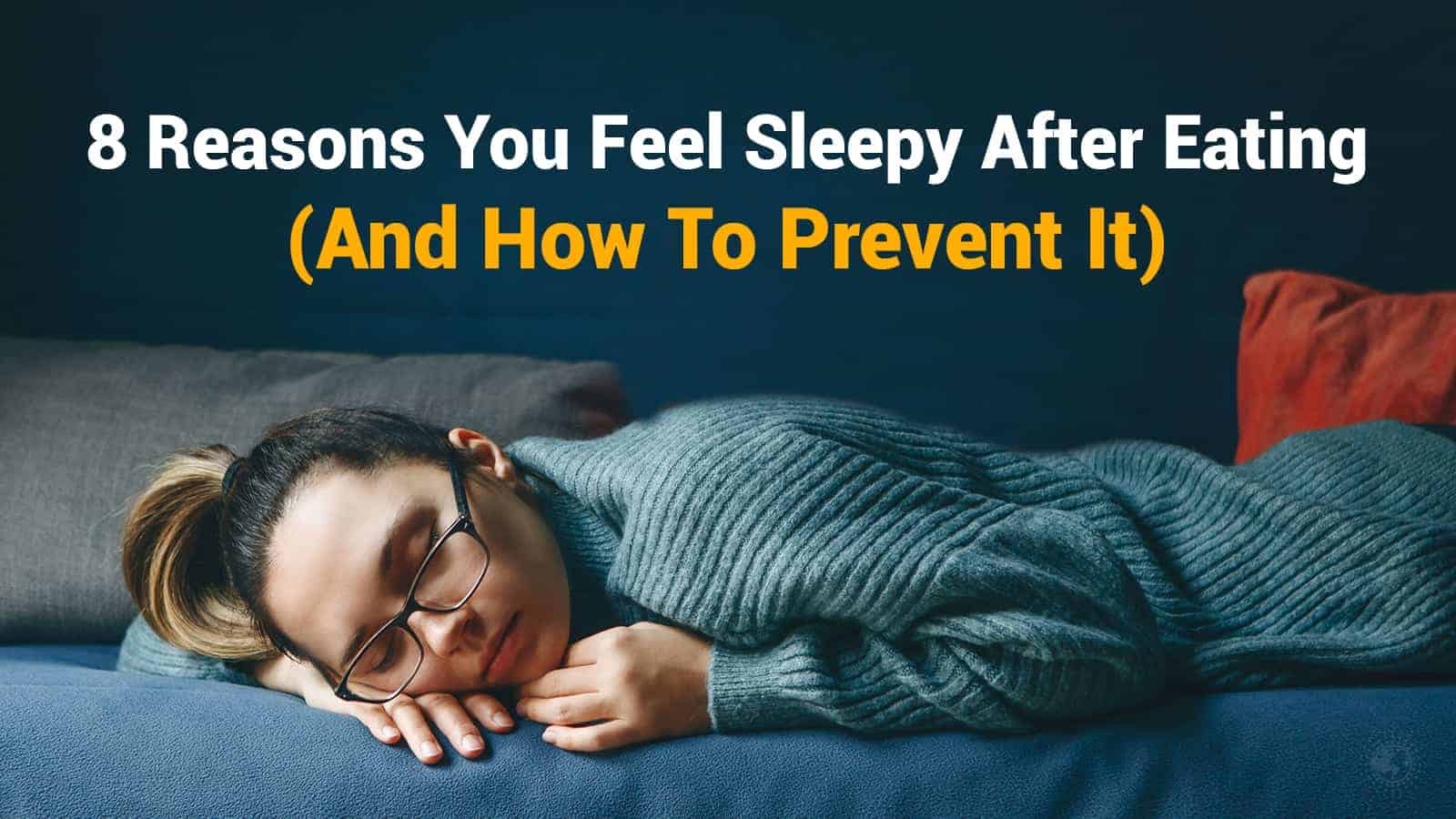Feeling drowsy after you eat is a common experience, especially after lunch. It can make it difficult to stay awake and stay focused when you have a long day left ahead of you and need to concentrate.
So why does this happen? And how can you work around or reduce this sudden onslaught of tiredness?
8 Reasons You Feel Sleepy After Eating
Here are 8 reasons you feel sleepy after eating and how to prevent it in 7 ways.
 1. Your Sleep Habits
1. Your Sleep Habits
Feeling sleepy can sometimes be traced back to a very simple root: not sleeping well enough in a no-brainer sort of way. If you normally feel a little drowsy throughout the day and find it exacerbated after meals, the first thing you may want to do is take a look at your sleep habits. Your problems may be caused by:
- Not getting enough sleep the day before
- Having poor quality sleep (sleep without sufficient restorative deep sleep)
- Maintaining an uneven sleep schedule
2. Eating a Lot of Carbs
Carbohydrates give you energy and are good for you. But eating too much can contribute to many health issues, and at the tip of the iceberg is the sleepiness you likely feel after stuffing yourself with too many carbs in one sitting.
Why does this happen? Well, carbohydrates help the body to produce higher levels of serotonin. On the one hand, serotonin can boost positive thinking and regulate mood. On the other, it balances sleep cycles, so eating too much will make you feel sleepy.
While all carbs can make you sleepy, refined ones tend to be the worst, so try to opt for whole foods instead. Carbohydrates that may cause sleepiness, including the following:
- Rice
- Baked goods
- Rice
- White bread
- Sugary foods and drinks
3. Eating a Lot of Tryptophan
Tryptophan is a kind of amino acid found in certain kinds of protein-rich foods. You might associate the sleepiness you feel after a Thanksgiving dinner with positive memories. Still, it’s much less convenient when it’s getting in the way of your everyday life, not your relaxing holiday!
Like carbohydrates, tryptophan facilitates serotonin production, which is why it likely makes you feel sleepy after you eat it. Regulating your consumption of these foods should reduce the severity of its effects somewhat. Here are some examples of foods rich in this amino acid:
- Cheese
- Eggs
- Fish
- Pork
- Soy
- Spinach
- Spirulina
- Tofu
- Turkey
4. Your Physical Activity Levels
Do you tend to feel tired throughout the day, only to have it come to a head after meals? You might want to blame your activity levels instead of your food!
Exercise may be tiring when you perform it, but regular exercise makes you stronger, allowing you to enjoy more positive days and higher energy levels. This can help stave off the worst of post-meal tiredness.
If you live a sedentary lifestyle, try to squeeze in at least 150 minutes of exercise per week. This means half an hour of exercise five times a week!
5. High Food Consumption
Have you ever noticed that you feel sleepiest after a large meal? This is due to the sudden upshoot of blood sugar from big meals. This spike in glucose levels means your energy dives shortly after.
This happens twofold when those heavy meals involve carbohydrates or the protein tryptophan. Since most heavy meals tend to have many carbs, you’re essentially making it so sleepiness, after you’re done, is almost inevitable!
6. Eating Specific Sleep-Promoting Foods
Lots of foods unintentionally promote sleepiness. The Sleep Foundation lists some of the following as their recommendations for helping you get more sleep – so it goes without saying that they’re also likely to make you sleepy when you don’t want to be!
· Tart Cherries
Tart cherries are a little different from typical sweet cherries, and while both can make you sleepy, tart cherries are especially potent. Juice of these cherries can help you sleep quicker and for longer, say studies, thanks to the high levels of the sleep hormone melatonin contained in them.
· Nuts
Nuts have a variety of minerals and components in them that are conducive to sleep. Zinc, magnesium, and even melatonin are found in different amounts across nuts like pistachios, walnuts, cashews, and almonds. This combination has been found to have positive effects on insomnia and can make you feel sleepy.
· Kiwi
The kiwifruit is rich in minerals and vitamins, including folate, potassium, vitamin C, and vitamin E. They are also packed with antioxidants. It is believed that some combination of these components helps people feel sleepy more quickly, whether due to serotonin promotion or correcting deficiencies, but more research is needed.
7. Medical Issues
It’s rare, but sometimes post-meal sleepiness can be a symptom of a medical condition. Usually, this is accompanied by general fatigue on a chronic or constant scale. Some examples of these medical issues are:
- Anemia
- Celiac disease
- Diabetes
- Food intolerance or food allergy
- Sleep apnea
- Underactive thyroid
If you’re concerned about these issues, you should speak to a doctor, especially if you have other symptoms of those diseases and disorders.
 8. The Natural Cycle of Digestion
8. The Natural Cycle of Digestion
The natural digestive cycle is such that it’s almost natural to feel a little drowsy after eating. To better understand this, let’s go through each step of that process quickly and simply.
- Step 1: You consume food to get energy.
- Step 2: The digestive system breaks down food into glucose, which fuels the body.
- Step 3: Individual macronutrients are singled out and provide different benefits to the body. For example, protein’s calories can be used as energy.
- Step 4: As blood sugar or blood glucose goes up in the body, the body produces insulin to aid the cells’ absorption of glucose. When this process is over, blood sugar dips, reducing energy levels.
- Step 5: The process of digestion triggers other bodily responses. Hormones are released in the body that promote satiety, or fullness, such as glucagon, amylin, and cholecystokinin. Another hormone released is serotonin, which regulates sleep and causes drowsiness, especially when combined with foods that contain the sleep hormone melatonin.
As you can see, the digestive process results in hormones that can make you feel sleepy, and glucose shifts in the body add to that tiredness. Basically, if you feel sleepy after eating, it might just be because that’s how your body handles its digestive process!
How To Prevent Feeling Sleepy After Eating
1. Control Your Portions
Eating smaller meals does a few things, namely:
- Slows digestion, reducing the resulting sluggishness
- It stops you from feeling bloated and uncomfortable, which may make you drowsy
- It makes you hungry more often, leading to more frequent meals, which balances blood sugar highs and lows
In other words, by controlling your portions, you’re helping your body to manage the digestive process more positively, preventing the associated sleepiness that may arise from it.
2. Take a Walk
Taking a walk helps you feel more energized because it boosts oxygen levels within your bloodstream. It also helps facilitate circulation, which in turn speeds up the digestive process.
A short ten-minute walk can also boost your positive thinking, so you’re more likely to feel capable of powering through drowsiness after meals.
3. Drink Enough Water
Did you know that even very mild dehydration can negatively affect your positive thinking, ability to focus, and energy levels? That’s why you need to make sure you’re getting enough hydration.
You should be consuming about eight glasses, or two liters, or water daily, but on the whole, you should also drink whenever you feel thirsty. Drinking enough fluids can help your body overcome the slump after meals, especially since water is crucial in almost all of the body’s functions, including digestion.
4. Chew Gum
Chewing a moderate amount of gum for a reasonable amount of time may help facilitate wakefulness, alertness, mood, and memory, according to studies.
This happens because chewing is an activity that helps your body feel like it is in the middle of an action. This allows you to maintain energy levels or regain them if you’ve lost some. Mint-flavored gum is beneficial, thanks to its refreshing taste.
5. Avoid Unhealthy Foods
Junk food, sugar-rich food, and food high in bad fats can increase drowsiness. This is because they often facilitate a higher and sharper blood sugar spike, making the drop later much more drastic and noticeable.
Stick to healthy, lean meats, whole foods, vegetables, healthy fats, and other nutritious options to feel more awake and energized after meals.
Do note that alcohol is also considered an “unhealthy” option in most cases. While some alcohol is fine in moderation, you should limit how much of it you consume if you’re trying to avoid sleepiness.
6. Spend Time In Bright Light
The light dictates the body’s natural circadian rhythm and sleep-wake cycles. When you’re in dim lighting, the body begins to produce the sleep hormone melatonin, making you more tired.
Conversely, exposing yourself to bright light – especially bright natural light – will help you feel more alert and awake if you can get some.
7. If All Else Fails, Take A Nap
As a general rule, you should try your best not to take naps in the middle of the day, especially if you have trouble sleeping at night. But when it comes down to it, if you truly can’t keep your eyes open after a midday meal, a quick nap might be your best solution.
Studies have indicated that a nap after lunch can positively affect performance, both physical and mental, while helping you stay more alert. If that’s how you’re going to survive the day, then it’s as good a bet as any!
 Final Thoughts On Some Reasons Why You Feel Sleepy After Eating And Ways To Prevent It
Final Thoughts On Some Reasons Why You Feel Sleepy After Eating And Ways To Prevent It
After eating, feeling sleepy can be a big inconvenience when you’ve got work to do and several hours of daylight left ahead of you. Luckily, there are plenty of ways you can prevent this or help to perk yourself back up again if it happens. So all you need to do is understand if your eating habits may be causing it and work your way through from there!




















